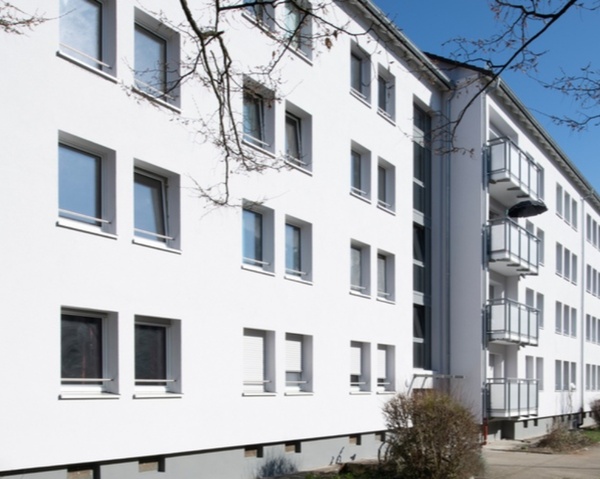Green and performance double win for the cold plate industry ABG, BASF and Sto enter new market for the cold plate industry
German companies are making significant strides in the field of green building materials innovation. Recently, BASF, a leading German petrochemical company, Sto, a specialist in insulation systems, and ABG Frankfurt, a housing association, have joined forces on a pilot project to explore the application of EPS insulation boards containing recycled components.

Frankfurt's iconic building: Insulation using EPS boards containing recycled materials (Photo: ABG/Jochen Müller)
In this collaborative project, the partners innovatively replaced approximately 10% of the polystyrene raw materials with recycled EPS. BASF revealed that, after rigorous technical testing, the boards manufactured using recycled components meet quality standards equivalent to those produced entirely from virgin raw materials, fully demonstrating the reliability of their performance.
These new type of thermal insulation panels have been applied to the exterior of Frankfurt Airport Building (ABG) renovation project. The building has 52 residential units, the renovation is of great importance. ABG Board Chairman Frank Koch stated that the construction workers' feedback, new type of thermal insulation panels in actual operation and assembly process, compared to traditional panels, have no significant differences.
Klaus Ries, head of BASF's European styrene business, further explained that the recycled materials used to produce Neopor F5 Mcycled EPS grade products come from mechanically recycled EPS waste. He also revealed plans to expand the sources of recycled materials in the future, incorporating more EPS waste from construction sites to further enhance resource recycling efficiency.
Frank Börner, the project manager for the Rhine-Main region at Sto AG, is confident about the increasing proportion of recycled content in future thermal insulation systems. He believes that with continuous technological advancements and growing market acceptance, recycled content will play a bigger role in the field of thermal insulation materials.
Market observers stated that this achievement is significant, especially concerning EPS materials. Previously, EPS was often misunderstood as non-recyclable, but this project has effectively corrected this misconception, injecting new momentum into the industry's sustainable development.
The British Plastics Federation (BPF) released data that also reflects the importance of the project. A survey found that 84% of respondents were unaware that EPS materials can be fully recycled, while 80% of respondents expressed their willingness to use the service if a local recycling point was established. BPF used this to urge local authorities to speed up the establishment of convenient recycling collection points, improve the recycling system, and increase the promotion of recycling, with the aim of driving the industry towards a new green level.
【Copyright and Disclaimer】This article is the property of PlastMatch. For business cooperation, media interviews, article reprints, or suggestions, please call the PlastMatch customer service hotline at +86-18030158354 or via email at service@zhuansushijie.com. The information and data provided by PlastMatch are for reference only and do not constitute direct advice for client decision-making. Any decisions made by clients based on such information and data, and all resulting direct or indirect losses and legal consequences, shall be borne by the clients themselves and are unrelated to PlastMatch. Unauthorized reprinting is strictly prohibited.
Most Popular
-

Key Players: The 10 Most Critical Publicly Listed Companies in Solid-State Battery Raw Materials
-

Vioneo Abandons €1.5 Billion Antwerp Project, First Commercial Green Polyolefin Plant Relocates to China
-

EU Changes ELV Regulation Again: Recycled Plastic Content Dispute and Exclusion of Bio-Based Plastics
-

Clariant's CATOFIN™ Catalyst and CLARITY™ Platform Drive Dual-Engine Performance
-

List Released! Mexico Announces 50% Tariff On 1,371 China Product Categories






